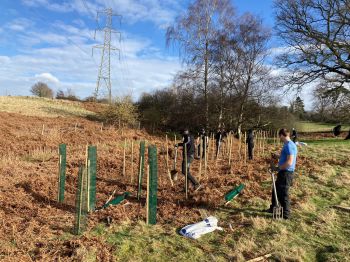University news
New innovative scheme helps university sow the seeds for a sustainable future
Posted on behalf of: Lauren Ellis
Last updated: Tuesday, 3 September 2024

The University of Sussex has taken a big step in helping to reduce its carbon footprint with an innovative new sustainability initiative.
‘Trees for Trips’ was launched by the University, in June 2023. The scheme has encouraged visitors travelling to Open Days at its Falmer campus over the past year, to leave their car at home and switch to public transport to help cut their carbon emissions. For everyone that has, the University has planted a tree.
By autumn, over 1,300 trees will have been planted with support from Trees for Graduates, a tree planting initiative born from Sussex students, and the South Downs Trust, with plans for the initiative to continue into future Open Days. Partnering with local farmers, landowners and communities, trees have so far been planted at Multan Farm (Burgess Hill), Oak View Farm (Bolney) and Truslers Well (Albourne) with many student volunteers taking part.
As a result, an impressive 31.013 tonnes of carbon emissions have been avoided across three Open Days in June 2023, October 2023, and June 2024 – the equivalent to one person flying more than three and a half trips around the world via plane.
Prof Sasha Roseneil, Vice-Chancellor and President of the University of Sussex, said:
“The commitment of the University of Sussex to combatting the climate crisis runs through all our actions, and it is our ambition to be one of the world’s most environmentally sustainable universities. Our current students are passionate about the urgent need to change how we all live, work, and travel, and they have inspired our ‘Trees for Trips’ initiative to encourage prospective students and their families to make green transport choices as part of their wider decision making about university.
“We are very fortunate that the Sussex campus is extremely well connected by public transport, with our own train station at Falmer and numerous bus routes. We have been delighted that so many people have been choosing to visit us sustainably, thereby not only reducing carbon emissions, but also resulting in the planting of over a thousand new trees.”
Sussex aims to achieve net zero carbon emissions by 2035 and to become one of the most environmentally sustainable universities in the world. This initiative demonstrates practically to prospective students the University’s commitment to environmental sustainability.
Sussex students are encouraged to think about the impact they have on the planet from the first day they visit, to the day they graduate.
The University offers a Climate Leadership Scholarship worth £3,000 per year of full-time study for eligible undergraduate, Masters and PhD students. The scholarship supports the next generation of sustainability champions to develop a sustainability driven project, with mentoring support to get their idea off the ground.
During their time at university, Sussex students are also equipped with the tools to make informed choices about the food they consume. Earlier this year, the University’s Attenborough Centre for the Creative Arts (ACCA) cafe introduced carbon labels to their food menus, indicating which options have a low or high carbon rating. The aim is to measure and reduce the environmental impact of food and give students, staff and the wider community greater information about the carbon footprint of the food served on campus, prioritising local produce.